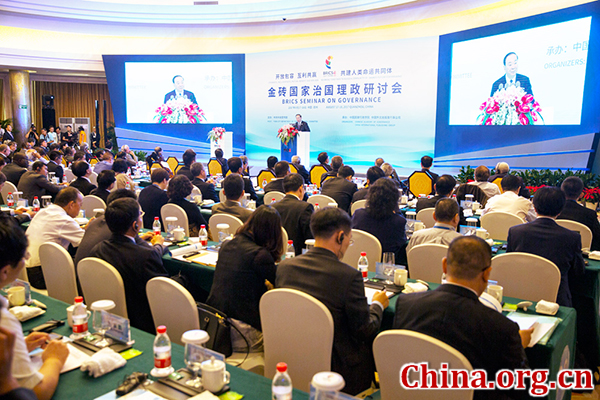Chinese experience highlighted at BRICS seminar on governance
 0 Comment(s)
0 Comment(s) Print
Print E-mail Xinhua, August 18, 2017
E-mail Xinhua, August 18, 2017
|
|
|
The BRICS Seminar on Governance is held in Quanzhou, southeast China's Fujian Province, Aug. 17, 2017. [Photo by Dong Ning/China.org.cn] |
More than 100 academics, consultants and business leaders gathered Thursday in southeast China to brainstorm ideas on governance in emerging markets.
The BRICS Seminar on Governance was held in Fujian Province, where the 9th BRICS Summit will take place in about two weeks. Participants come from BRICS members -- Brazil, Russia, India, China and South Africa -- as well as other countries such as Tanzania, Kazakhstan, Chile, Guinea, Ethiopia, and Mexico.
Huang Kunming, executive vice minister of the Publicity Department of the Communist Party of China (CPC) Central Committee, which hosted the seminar, said BRICS countries are in similar stages of development, confronted by similar challenges. Sharing experience on governance will help participants learn from one another and improve development.
BRICS members account for about 23 percent of the world economy. They jointly contributed more than half of global growth in 2016. The grouping, based neither on ideology nor geopolitics, is seen as a new and perhaps better form of global governance in which emerging markets play key roles.
But in recent years, BRICS members and other developing countries have encountered difficulties and setbacks. China, though its economic growth has slowed, remains stable and resilient as it moves toward a "moderately prosperous society" by 2020.
Peking University professor and former World Bank chief economist Justin Lin Yifu said that among nearly 200 developing economies after WWII, only two have transitioned from low-income to high-income economies. China may become the third by 2025.
Sharing the findings of his latest study, Lin said the main reason developing economies remained trapped in middle-income or low-income status was that most of them followed Western mainstream economic theories, either structuralism or neoliberalism, and failed to maintain a balance between the market and the state.
Structuralism advocates excessive intervention, while neoliberalism champions "laissez faire," he said.
"The secret of China's success is its use of both 'invisible hand' and 'visible hand,'" Lin said. Only when the market and the state play their respective roles can technological innovation and industrial upgrading proceed smoothly, he said.
Robert Kuhn, a China expert from the United States, expounded on how Chinese decision makers used the "Four Comprehensives" as an overarching framework and strategic blueprint to reach development goals.
The "Four Comprehensives" encompass efforts to pursue a moderately prosperous society, reform, rule of law and Party discipline.
Kuhn has penned many books on Chinese governance, the latest being "How China's Leaders Think." He said foreigners who dismiss these political aphorisms as simplistic sloganeering miss an opportunity to enrich their understanding of the realities of China and of governance experience that has broader applicability in the world.
Director of the China-Brazil Center for Research and Business Ronnie Lins said China's development model could serve as a benchmark for developing countries.
Essop Goolam Pahad, the editor of South Africa's Thinker Magazine, said China's experience in fighting poverty, for example, offers critical lessons for Africa.
China has lifted 700 million people out of poverty over the past 30 years and aims now to end poverty by 2020.
Pahad, who once served as Minister in the South African Presidency, said poverty persists in many African countries. Close to 400 million Africans survive on less than 1.25 U.S. dollars a day.
Pahad said one Chinese lesson he learned was that the battle must begin by addressing the mindset of communities and their leaders: they must believe that development is possible, whatever the odds.
"The weak hatchling will never take off if it depends on government aid, financial grants, and welfare allowances," he said.
While highlighting China's success, most participants at the seminar also agreed that there is no one-size-fits-all development model to be copied.
Beijing has no intention of imposing its development model onto others, officials and experts said.
He Yiting, executive vice president of the Party School of the CPC Central Committee, said though China has made significant contributions to world governance, no development model remains unchanged.
He said the governance chaos we have seen around the world is largely a result of countries failing to find their development paths. The situation has been further complicated by foreign intervention.
"It is only the person who wears the shoes who knows whether they fit," he said, citing a Chinese proverb. "It depends on the people of a country to choose what suits them best."






